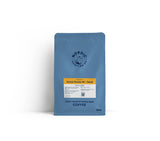Origin: Piendamó, Cauca, Colombia
Producer: Wilton Benítez, Granja Paraíso 92, 1950 m.a.s.l.
Process: Anaerobic Arabica + Double fermentation
Variety: Red Bourbon
Tasting Notes: Lemongrass, Green Mandarin, Lemon Balm
Roast Degree: Light
Produced by Wilton Benitez at Granja Paraiso 92, this sugar cane decaf redefines what decaf can really be. Wilton’s meticulous processing includes whole cherry fermentation with added yeast, followed by a second fermentation with natural coffee fruit juice (mosto). These steps infuse the beans with unique flavours, while sugar cane decaffeination preserves their sweetness and complexity.
Sugarcane Decaffeination
The sugarcane decaffeination process, also known as ethyl acetate (EA) decaffeination, involves removing caffeine from green coffee beans using ethyl acetate, a natural solvent derived from sugarcane. This method is considered more environmentally friendly and produces fewer chemical residues compared to other decaffeination techniques.
The process consists of several key stages:
-
Pretreatment:
The green coffee beans are steamed at low pressure to open their pores and facilitate caffeine extraction. -
Extraction with Ethyl Acetate:
The beans are soaked in a solution of ethyl acetate, which bonds with the caffeine molecules and extracts them from the beans. -
Removal of Ethyl Acetate:
Once the caffeine has been removed, the beans are steamed again to eliminate any remaining ethyl acetate, resulting in fully decaffeinated coffee.
Ethyl acetate, a byproduct of sugarcane molasses fermentation, is used as a solvent because it selectively removes caffeine while preserving most of the coffee’s original aromatic compounds. The result is a decaffeinated coffee that retains much of the flavor and aroma of its caffeinated counterpart.
Our packaging is made of 100% recyclable plastic.




